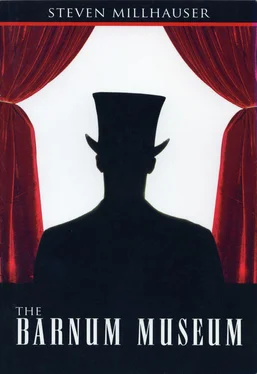“I thought you might like to see these,” she said, taking off the lid and holding out a box tightly stuffed with postcards. “There are some very nice views.”
“Not today, no, not right now. Here, allow me.” I took the box from her, tucked it under my arm, and followed her to the front of the shop. My umbrella hung by its handle from the side of the counter. I set down the box next to the cash register and pulled from the candy rack a cellophane bag of gumdrops. “One of these instead.” There was no price on any of the candy; I looked forward to being amazed. Plumshaw disappointed me by ringing up seventy-five cents. “More rain,” I said, gesturing vaguely toward the window.
“It rains often, here in Broome.” She paused a moment, drew herself up, and added, “The jellybeans are also very good.”
In my room I ate two gumdrops and packed my bag, which seemed to contain nothing but damp clothes. As I swung across the landing I nearly knocked into the woman with the book, who looked at me in alarm and stepped back against a wall. “Wonderful weather!” I said. She blinked at me through her glasses and said quietly, as if reproachfully, “I love it when it rains.” She looked disapprovingly at my suitcase. I reached into my pocket and held out the open bag of gumdrops. She shook her head quickly. I imagined staying at Broome, taking her out to dinner, marrying her. “I don’t like gumdrops,” she said. “Goodbye,” I said, and bounded down the stairs. At the desk in the front hall Mrs. Kearns looked at my suitcase with red, rheum-glittering eyes. I had paid for three nights; she said nothing at all as I nodded at her and stepped onto the front porch.
Rain splashed on the flagstone path and ran from the roof gutters. I turned up the collar of my trench coat and made my way through cuff-high wet grass to the gravel parking lot pooled with rain. My windshield was covered with large wet leaves. I threw my dripping suitcase in the car and backed out onto the muddy lane, remembering suddenly the black-and-silver ballpoint I had left on the writing table, and making a mental gift of it to John Kearns. It would look good in the pocket of his corduroy jacket. As I turned onto the steep street, in the uphill direction, I saw the shops plunging downhill in the rearview mirror, and I was seized by the certain feeling that the moment the street vanished from view, suddenly the clouds above the shops would part, a big yellow sun would burst forth, the sky would turn bright, dazzling blue.
THE EIGHTH VOYAGE OF SINBAD
Late afternoon, the slant sun bright and the sky blue fire, Sinbad the merchant sits in the warm shade of an orange tree, in the northeast corner of his courtyard garden. Through half-closed eyes he sees spots of sun in leafshade, the white column of the marble sundial, the flash of light on a far white fountain’s rim. The voyages flicker and tremble like sunlight on fountain water, and Sinbad cannot remember on which of the seven voyages he arrives at a shore where the trees have ripe yellow fruit and the streams flow crystal clear, he cannot remember, he cannot remember whether the old man clinging to his back comes before or after the hairy apelike creatures who swarm upon the ship, gnawing the ropes and cables with their sharp teeth.
The first European translation of The Arabian Nights was made by the French orientalist Antoine Galland, in twelve volumes published between 1704 and 1717. Galland’s Les Mille et Une Nuit [sic], Contes Arabes , contains only twenty-one stories, including the Histoire de Sindbad le Marin . It is interesting to consider that neither Shakespeare, nor Milton, nor Dante, nor Rabelais, nor Cervantes knew the story of Sinbad the Sailor, or indeed of The Arabian Nights , which did not exist in the imagination of Europe until the eighteenth century.
I abode awhile in Baghdad-city savoring my prosperity and happiness and forgetting all I had endured of perils and hardships and sufferings, till I was again seized with a longing to travel and see strange sights, whereupon I bought costly merchandise meet for trade, and binding it into bales, repaired to Bassorah. There I found a tall and noble ship ready to sail, with a full crew and a company of merchants. I took passage with them and set forth in all cheer with a fair wind, sailing from island to island and sea to sea, till one day a great darkness came over the sun, whereat the captain cried out, “Alas! Alas!” and cast his turban to the deck. Then the merchants and the sailors crowded around him and asked in great fear, “O master, what is the matter?” Whereupon he answered, “Know, O my brethren (may Allah preserve you!), that we have come to the sea of whirling waters. There is no might save in Allah the Most High, who alone can deliver us from destruction.” Hardly had he made an end of speaking when the ship struck a great swirling and tumbling of waters, which carried it round and round. Some of the merchants were thrown from the ship and drowned, and others made shift to shelter themselves; I seized a rope and lashed myself to the mast, from which post I saw our ship plunge down in the turning water-funnel till the walls of ocean reached high overhead. Then as I fell to weeping and trembling, and besought the succor of Allah the Almighty, behold, a great force smote the ship and broke it into planks, throwing me into the sea where I seized a piece of mast and continued to be carried down by the turning water; and I was as a dead man for weariness and anguish of heart.
From the pillowed divan in the northeast corner of the courtyard garden, under the shady orange tree, Sinbad can see, through leafshade and sunshine, the white column of the marble sundial that stands in a hexagon of red sand in the center of the courtyard. He cannot see the black shadow on top of the sundial, cast by the triangle of bronze, but he can see the slightly rippling shadow of the column on the red sand. The shadow is twice the length of the column and extends nearly to the edge of the hexagon. Sometimes he remembers only what he has spoken of, say the tall white dome soaring above him and how he walked all around it, finding no door. But sometimes he remembers what he has never spoken of: the stepping from sun to shadow and shadow to sun as he circled the white dome of the roc’s egg, the grass, crushed by his footsteps, rising slowly behind him, the sudden trickle of perspiration on his cheek, the itching of his left palm scraped on a branch of the tree he had climbed shortly before, his head among the leaves, and there, beyond the great white thing in the distance, a greenish-blue hill shaped like a slightly crushed turban, a slash of yellow shore, the indigo sea.
There are two different versions of the Sinbad story, each of which exists in several Arabic texts, which themselves differ from one another. The A version is “bald and swift, even sketchy” (Gerhardt, The Art of Story-Telling: A Literary Study of the Thousand and One Nights , 1963); the B version is “much more circumstantial.” The B redaction may be an embellished version of A, as Gerhardt thinks likely, or else A and B may both derive from an earlier version now lost. The matter of embellishment deserves further attention. B does not simply supply an additional adjective here and there, but regularly provides details entirely lacking in A. In the first voyage, for example, when Sinbad is shipwrecked and reaches an island by floating on a washtub, he reports in the B version that “I found my legs cramped and numbed and my feet bore traces of the nibbling of fish upon their soles” and that, waking the next morning, “I found my feet swollen, so made shift to move by shuffling on my breech and crawling on my knees” (Burton) — details not present in A. In this sense, B is a series of different voyages, experienced by a different voyager.
Читать дальше












